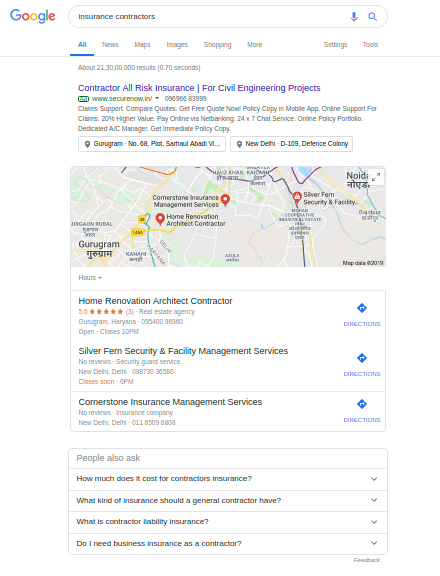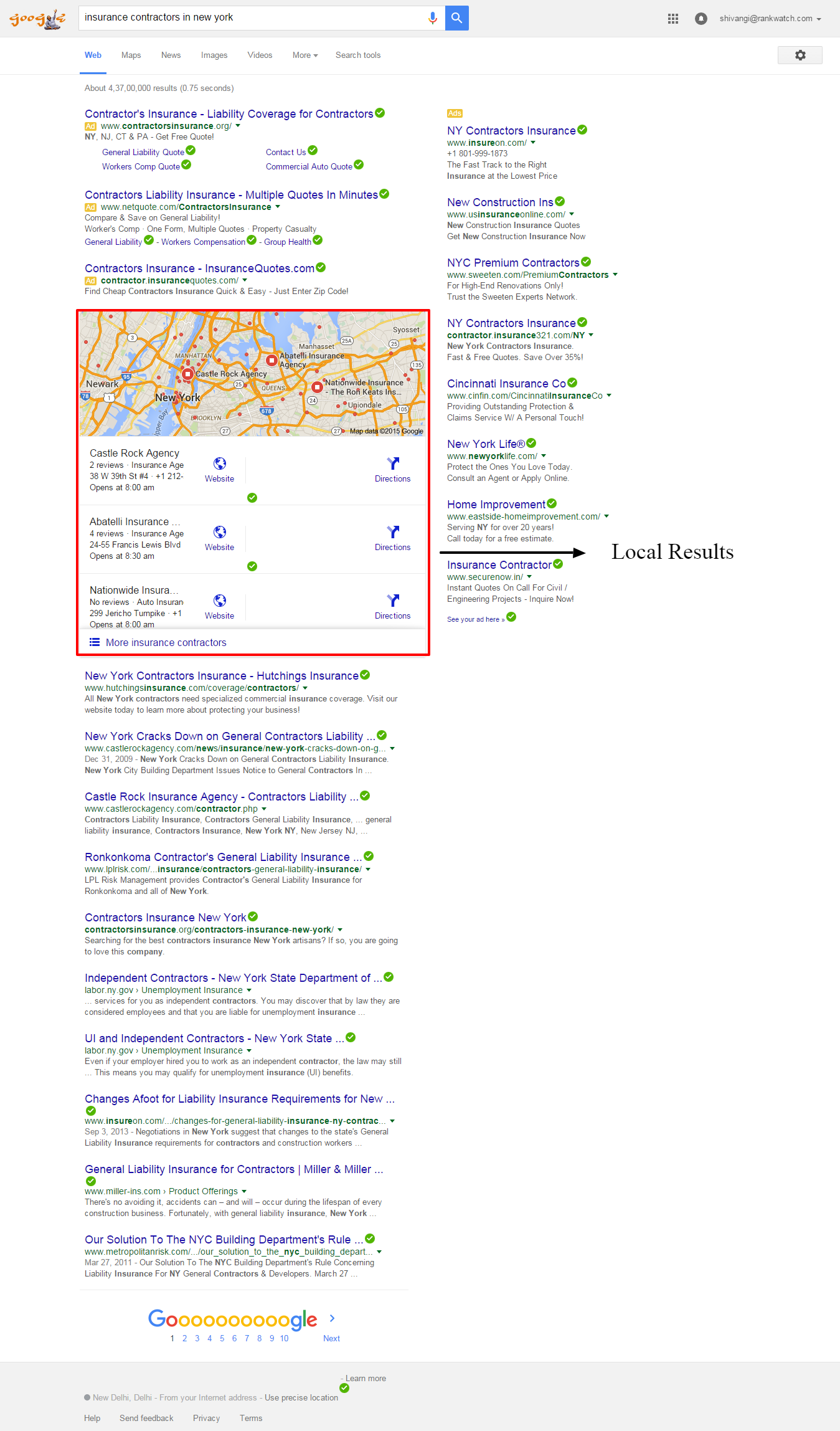Difference between Local SEO vs Organic SEO?
The increasing number of ways through which your potential customers can reach out to you, have become commendable through the advancement in technology.
Certainly, whenever a user wishes to gather information about some place, person or thing, he would look out for the same online. Now, the subject of the search would determine the types of results that Google will show up with.
Google has the absolute right to decide which websites earn the right to be displayed on the precious first slice of their SERPs and, therefore in some cases, it might include the local results with the organic ones, giving the users exactly with what they want, and thus leading to a happy and satisfied user. For business owner, both local and otherwise, these searcher’s reactions and satisfactions determine their success and failures.
Now, when we mention SEO, most of the times it is associated with Organic SEO. Although, SEO is an evolving and imperative practice which has to be employed by webmasters to survive the online world, we fail to understand that Local SEO also forms one of the important aspects of SEO.
Before going into the difference, let’s get a quick recap (for details, refer RankWatch Learn Section) of both Organic and Local SEO
Organic SEO
Organic SEO is a marketing practice of optimizing your website to make it search engine friendly and get it ranked for relevant keywords. It might or not include a local element, but is usually not associated to a brick or mortar business. It essentially more or less, revolves around a website. The websites aiming at Organic SEO can therefore, be a full-fledged-internet-based-website which might or might not have a geographical location. Bloggers, Internet marketers, affiliate marketers, internet-based business and some brick and mortar business employ Organic SEO to work towards improving their rankings and increasing their traffic. Some examples of keywords that could be used in organic seo campaigns include ‘beauty tips’, ‘solar panel installation procedure’ etc.
Only those websites rank in the organic results which have trusted content and can provide value to the users. So, you can say that in organic seo, search engines rank and favour trusted and relevant content.
An example of organic search would be to search ‘Insurance Contractors’, the highlighted results are the organic ones. These websites which are ranking on this page, are considered to be legitimate by Google in terms of the content/services/information they offer.
Now, what if you are a small insurance contractor in New York, how will you make your way up there? How would you let your users know about your existence? Here’s when Local SEO comes into the picture.
Local SEO
Local SEO is simply the practice of building reliability and relevant signals around specific locations. Continuing the above example, when the user searches insurance contractor in New york, the following result would come up:
These results basically show the insurance contractors that are relevant to the users and present in the New York city. The local results are usually labelled with customer ratings, reviews and other information about the business including hours of operations, directions, phone number, address etc.
In simple terms, the search engines display the results based on geographically related keywords used in the search query. Some examples that could be used in local seo campaign include ‘florists in Pasadena’, ‘divorce attorneys in California’, ‘dog walkers in LA’ etc.
Those 3 results outlined in a box are the Google Local Listings Pack, which displays the top 3 relevant results. If you are a local business, this is the place where you would want to be.
So, you can say in local seo, search engines rank and favour those websites which have relevant and trusted locations.
So, the difference?
I think by now, you have clearly understood the difference. But still, let me state that in clear words to get a better and clear understanding.
- The first difference is out there, shouting loud: Locations, locations and locations.
Organic SEO is employed by websites that might or might not have a geographic location. It can be influenced by the location, but is definitely not attached to a brick-or-a-mortar business.
Pure Organic results are a mix of businesses, articles, blogs, news, social media profiles etc. Organic search and results are totally independent of the locations.
On the other hand, local SEO is essentially tied and associated with a brick-and-mortar business and necessarily has a geographical component. For example, if someone searches for a ‘car service in Pasadena’, the search engines would get, that the user wants a local business in Pasadena, that can service their cars. Therefore, here the search engines are looking out for trusted and relevant business that do car service around the user’s locations.
- Local SEO and Organic SEO do not necessarily target the same position on the SERPs.
While Organic SEO aims to rank as high as it can for a specific set of keywords, the main aim of Local SEO is to get into the local listing packs. Additionally, Local SEO is about being present or listed (with consistent citations) at every other place where the potential customer might look for including niche directories, forum etc.
- Links of Organic SEO Vs Citations of Local SEO
Links (correction: quality links) are the votes in the world of SEO that could get you better rankings and increased traffic. In Organic SEO, high quality and relevant links help you increase the relevance and authenticity of your website in the eyes of Google. All factors remaining constant, the greater the number of quality links, the better is the ranking.Local SEO, on the other hand do not treat links in the traditional way, this role is played by Citations here. Citations are simply the mentions of your Business name, Physical address and Phone Numbers across the web. Being consistently cited at all the relevant and important places in your niche would increase the relevance and authority of your business in the eyes of Google. It would not count as a ‘vote’, but would definitely validate the existence of your business at a certain geographical location. This will increase the chances of your business to show up, if any query related to the similar business and locations comes up.
- The approaches for doing Local SEO and Organic SEO is different
As mentioned earlier, the aim of Organic SEO is to only reach at the top places on SERPs. To make this happen, a lot of On-page optimization and Off-page optimization is required to be done on the website including working on your title tags, meta-descriptions, heading tags, optimising anchor texts, creating amazing content, building an effective link building strategy and lots more.
Local SEO, on the other hand aims to crack all places that displays local results. To make this happen, the strategy needs to be different. Apart from optimizing your title tags and keyword density, you need to first of all create a Google Listing. Going ahead, you should get listed at all the important directories in your niche and check for the consistency of NAP across the web, encourage the customers to write good reviews about you, write local content etc.
Which of these is the best for your business?
Businesses that go or Organic SEO usually aim to rank for specific keywords and trusted content. On the other hand, businesses that work on a local search marketing campaign aims to rank for particular location tied to the business.
The choice of doing Organic SEO or Local SEO depends on the nature and kind of your business, as each has its merits. If your customers are not tied for a specific location, you would want to go for Organic SEO.
On the other hand, if you have a business that sells its products or provides its services in a particular geographical area only, then Local SEO is the thing for you.



Share Your Thoughts